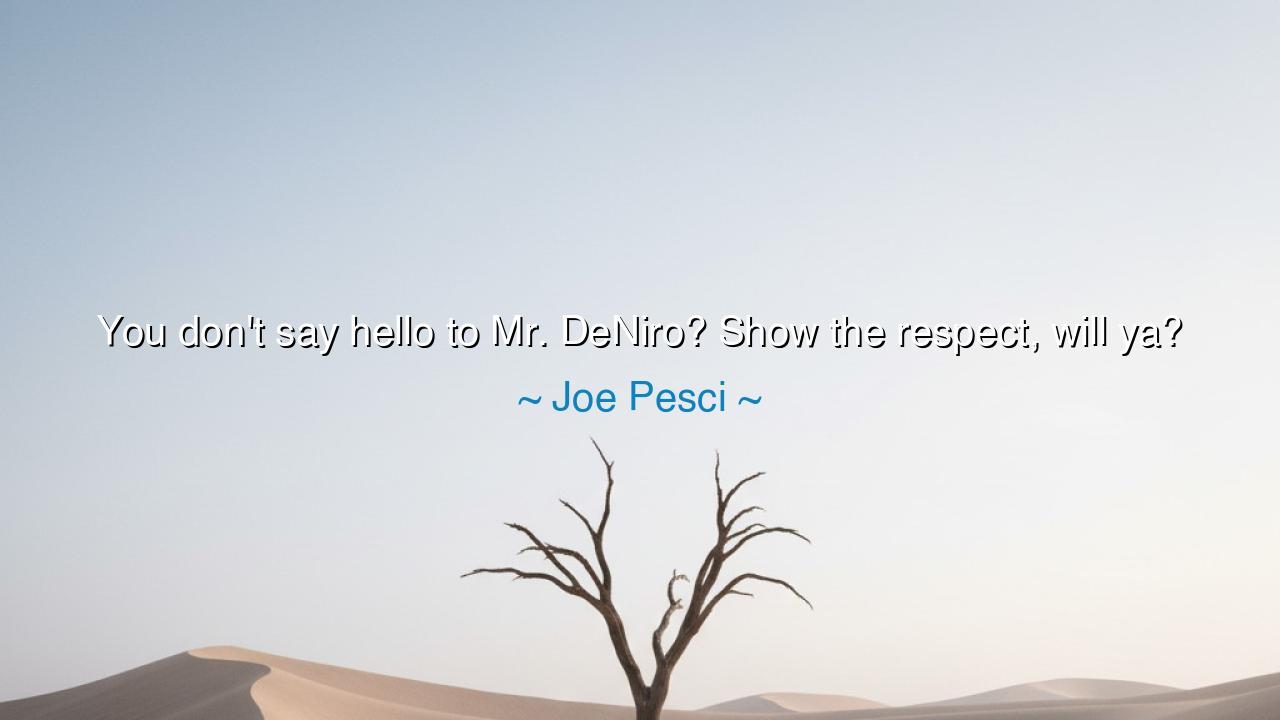
You don't say hello to Mr. DeNiro? Show the respect, will ya?






Hearken, O seeker of meaning, to the words that fell from the lips of Joe Pesci, spoken not merely as banter, but as a flame of truth: “You don’t say hello to Mr. DeNiro? Show the respect, will ya?” Though wrapped in jest, though born of camaraderie among actors, its essence is as old as mankind itself. For in these words lies the eternal reminder that honor is owed where honor has been earned, and reverence must be paid to those whose lives have carved paths of greatness.
Consider first the name that rests in the sentence’s heart: Mr. DeNiro. Not just a man, but a figure whose craft, whose dedication to the art of cinema, has lifted him beyond the ordinary. To call him simply by his name is to speak of countless roles, fierce transformations, and the raw embodiment of human struggle upon the screen. Thus when Pesci commands, “Show the respect,” he is not instructing us to bow to mere celebrity. He is reminding us of the sacred act of acknowledgment—of seeing greatness before us and not turning our eyes away.
In the olden days, kings and sages were saluted at the gates; warriors bowed their heads to their generals; disciples honored their masters before breaking bread. Not for vanity, but for the harmony of order, for the flame of gratitude that burns brighter when given voice. To withhold a greeting, to pass silently, is not neutrality—it is the theft of honor. The ancients knew this: respect unspoken weakens the bond of community, while respect declared binds souls together in strength.
Recall, if you will, the tale of Alexander the Great when he visited the temple of Ammon at Siwa. Though a conqueror who bowed to no man, he offered reverence to the oracle, greeting it with humility. His armies murmured in confusion, but Alexander knew—one must acknowledge power greater than oneself, whether divine, ancestral, or in the mastery of another. For only by showing respect do we ourselves rise to dignity. Thus Pesci’s words echo the wisdom of empires: greeting is not mere politeness, but recognition of shared greatness.
And yet, the quote stirs more than just memory—it provokes the heart. How often in our own days do we walk past teachers, elders, colleagues, even strangers, without so much as a nod? How often do we deny the humanity of another by denying the simplest gift: acknowledgment? If respect can be as simple as “hello,” then what poverty of spirit it is to withhold it! To greet is to affirm: I see you, I honor your presence in this world.
There is also playfulness in Pesci’s tone, a spark of the familiar. But even in jest lies wisdom. He does not say, “Bow low, kneel, or worship.” He says only, “Say hello.” The lesson is plain: reverence does not always require grand gestures. A small act, sincere and timely, can carry the weight of an empire’s salute. The wise know that the smallest acknowledgment can uplift the soul of another, and the unwise learn too late that silence can wound more deeply than words.
So, O listener, what teaching shall you take from this? Let your life be a song of recognition. Speak greetings often. Show respect without being asked. When you meet one who has walked longer upon this earth, say the words. When you see one who labors, honor the effort. When you encounter greatness—whether in art, in craft, in courage, or in love—do not pass in silence. Show the respect.
Practical action is simple: tomorrow, greet those you pass, from the doorkeeper to the master of the house. Send words of gratitude to those whose work has touched you. Do not wait until death or absence forces your lips to form belated honors. For respect is not owed only to legends like DeNiro—it is owed to all souls who walk beside us. Let Pesci’s fiery admonition guide your days, so that your presence will be remembered not for pride withheld, but for honor freely given.






AAdministratorAdministrator
Welcome, honored guests. Please leave a comment, we will respond soon